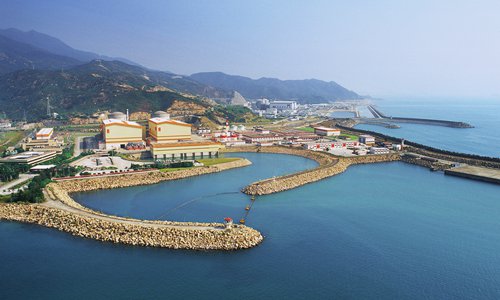SOURCE / INDUSTRIES
Daya Bay a dependable electricity source for Hong Kong
Cost-effective, clean power supports local economy

A view of the Daya Bay Nuclear Power Station in South China's Guangdong Province Photo: Courtesy of DNMC
The Daya Bay Nuclear Power Station in South China's Guangdong Province has been steadily providing electricity to the Hong Kong Special Administrative Region (HKSAR) for 25 years, making a great contribution to Hong Kong's development, economy and the environment.
As of June, the Daya Bay station had provided 254.674 billion kilowatt hours (kwh) of electricity to Hong Kong since 1994, said Zhao Fuming, chief safety officer of the Daya Bay Nuclear Power Operations and Management Co (DNMC), on Thursday.
It steadily sends about 12 billion kwh of electricity to Hong Kong each year, accounting for one-quarter of the SAR's electricity supply.
The six units of the Daya Bay station have generated 731.397 billion kwh of electricity in total since it began commercial operations in 1994, according to the latest statistics.
Since commercial operations began, the station has maintained safe and reliable operation and contributed to the socioeconomic development and environmental protection of Hong Kong, as well as the Pearl River Delta region, Chinese President Xi Jinping said on September 29, 2009.
Xi, who was then the vice president, made the remarks while attending a signing ceremony for the extension of the joint venture contract of the Guangdong Nuclear Power Joint Venture Co Ltd in Beijing.
The Daya Bay Nuclear Power Station has always provided clean and environmentally friendly energy, supporting the Guangdong-Hong Kong-Macao Greater Bay Area to beat air pollution, Zhao told the Global Times.
"Our units are always running at full power, which allows Hong Kong's thermal and gas-powered stations to remain on stand-by and benefits the region's environment," Zhao said.
"Also, the electricity we provide is cheaper than that generated in Hong Kong," he said.
Located at the Dapeng Peninsula in Shenzhen, Guangdong Province, the Daya Bay Nuclear Power Station is about 60 kilometers from Hong Kong. It is the first commercially operated nuclear power plant of its kind in the Chinese mainland, as well as the largest China-foreign joint venture project in the earlier stages of reform and opening-up, which began in 1978.
In the past 25 years, the station has been running safely. As of Thursday, its Ling'ao 1 unit had safely operated for 4,823 days consistently, a world record.
The Daya Bay Nuclear Power Station "has earned a good reputation in the management, operation and safety in the World Association of Nuclear Operators, an organization of industry leaders," according to the website of CLP Power Hong Kong, the power station's partner in Hong Kong.
"Nuclear power is safe and stable. It essentially emits no residue or carbon emissions. We believe sustainable development of our nuclear projects will be one of our measures to ease global climate change," it said.
Open to public
"We always hold an open attitude toward the Hong Kong public," Yu Bo, section chief of public affairs branch at DNMC, told the Global Times on Thursday.
In 2018, a total of 2,628 Hong Kong residents visited the power station, he said. Yu said that these visits are organized by CLP and can be booked online.
"At the beginning, the plant was visited mostly by nuclear power specialists and lawmakers, but now residents of all fields and ages come. Summer camps for Hong Kong students are also held here," he said.
Yang Weizhi, director of brand and public opinion at DNMC, said that Hong Kong media organizations' concern toward the Daya Bay station has also changed. "At the very beginning, they discussed if the station was safe or not. But now they care more about our management and transparency."
Zhao said that the Daya Bay station has insisted on openness to the public. It runs an open webpage showing information, statistics and conditions of the power station, which is a first in China.



